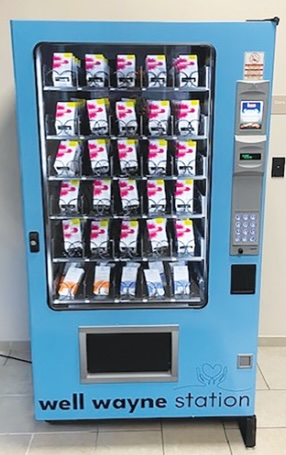CBHJ and Wayne County partners discuss lifesaving harm reduction initiatives on WDET
Tara King, Community Behavioral Health Administrator for Wayne County Department of Health, Human & Veterans Services, and Alexandria Hughes, Project Coordinator at Wayne State University’s Center for Behavioral Health and Justice (CBHJ), were featured on WDET’s The Metro. The two discussed their collaborative work on the Well Wayne Station initiative, a project aimed at placing vending machines and porch boxes stocked with life-saving naloxone (Narcan) and other harm-reduction tools throughout Wayne County.
 The Well Wayne Station initiative is made possible by Wayne County Executive Leadership, including CEO Warren C. Evans and Director of the Department of Health, Human, and Veterans Services (HHVS), Dr. Abdul El-Sayed. It is a multi-year initiative offering free, low-barrier access to naloxone and drug-checking supplies like fentanyl and xylazine test strips through public health vending machines and porch boxes.[i] The goal is to reduce overdose deaths and ensure all Wayne County residents have access to these essential tools.
The Well Wayne Station initiative is made possible by Wayne County Executive Leadership, including CEO Warren C. Evans and Director of the Department of Health, Human, and Veterans Services (HHVS), Dr. Abdul El-Sayed. It is a multi-year initiative offering free, low-barrier access to naloxone and drug-checking supplies like fentanyl and xylazine test strips through public health vending machines and porch boxes.[i] The goal is to reduce overdose deaths and ensure all Wayne County residents have access to these essential tools.
“For some listeners, there may be familiarity with naloxone or NARCAN®, but I think it's important to raise awareness about what it is – which is a lifesaving tool that is safe and effective in reversing opioid overdose,” said King. “We know harm reduction strategies and efforts work. We really value the collaboration between the Center for Behavioral Health and Justice and Alexandria and her colleagues, as well as leadership at CBHJ, who have done a tremendous job in helping support this initiative."
Every day, hundreds of people in the U.S. die from overdoses, including an average of eight deaths daily in Michigan. Wayne County experiences the most overdose deaths in the state, making naloxone distribution a critical public health strategy. Naloxone is a proven, evidence-based tool that reverses opioid overdoses and has no impact on individuals without opioids in their system.
“There has been some misinformation in the community – a belief that having a naloxone distribution station will increase the likelihood of drug use, which is absolutely false, and the opposite has been shown,” said Hughes. “These are some of the myths we've had to dispel, and in general, there's a need for more education on harm reduction tools and how they do save lives.”
Naloxone vending machines and porch boxes are placed using a data-driven approach, prioritizing areas at high risk for overdose while minimizing proximity to police and surveillance to reduce stigma and fear. The CBHJ and Wayne County continue to work not only on making naloxone widely available in the community, but also on raising awareness and breaking down stigma surrounding harm reduction medications. Visit https://endoverdosewayne.org/ to view current station information, resources on how to identify and respond to an overdose, and instructions on how to use fentanyl and xylazine testing strips and naloxone.
About the Center for Behavioral Health and Justice
The Center for Behavioral Health and Justice at the Wayne State University School of Social Work delivers actionable data, person‐centered research and evaluation, and collaborative technical assistance at the behavioral health/criminal legal intersection to empower community partners to adopt high‐impact care solutions. We envision a society that prevents, deflects, and diverts people with behavioral health concerns from the criminal legal continuum to appropriate care settings as a means to optimize individual and community wellbeing.
About the Wayne County Department of Health, Human & Veterans Services
The Wayne County Department of Health, Human, and Veterans Services (HHVS) is dedicated to improving the well-being of Wayne County residents by addressing social determinants of health and fostering community wellness. Through its coordinated health, educational, and social services, HHVS strives to reduce disparities and promote equity by focusing on financial education, healthy living, and vibrant neighborhoods, with a vision of eliminating inequities tied to social and environmental justice.
About The Metro
The Metro is a daily program on Detroit’s WDET 101.9 FM, highlights local and regional news and underreported stories with a focus on diverse perspectives and impactful community issues.
[i] As of January 27, 2025, there are 38 Well Wayne Stations placed in 19 of 43 municipalities in Wayne County.